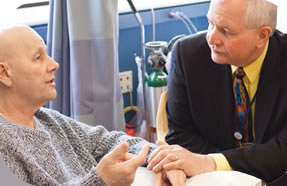Caring for Your Spirit
Deacon Wayne Charlton offers conversation, prayer to Rogel Cancer Center patients

Deacon Wayne Charlton trolls the University of Michigan Rogel Cancer Center's infusion area, seeking patients who might need a good talk. Every once in a while, he approaches a patient, who responds with a stricken look.
"They get a panicked look on their face like, 'Do you know something I don't?'" Charlton says.
Influenced by too many movies, patients sometimes think a chaplain's only role is to pray for patients near death. But in reality, spiritual care providers like Charlton work with patients with many different types of illnesses-life-threatening or not-to help them work through religious or spiritual issues that are oftentimes a part of illness.
Charlton, who recently joined the Rogel Cancer Center, has been helping patients for 20 years as a member of the U-M Health System's Spiritual Care Department.
"I see myself as another resource for hope for patients," Charlton says. "The time I spend with patients is dedicated to caring for their spirit, which needs as much healing as the mind and body."
Charlton says he meets with patients who have a lot of questions, but sometimes they have problems formulating them, often because they are confused or angry. If someone has a religious or spiritual orientation, it can be helpful to work through these questions in that context so that they can use that foundation as a resource for coping.
For Al Apsitis, a 64-year-old Howell man who has lymphoma, Charlton has been a brother as much as a chaplain.
"He's my buddy," he says. "We talk about anything and everything -- not just church and God. It's like talking to a brother about everything you do in life. And if I need a prayer, he'll say a prayer. He's just a good guy."
When Charlton first meets with new patients, he begins by talking with them to find a common frame of reference. He listens to patients' stories and helps identify what brings them comfort. A key part of Charlton's work involves helping patients to find ways to adapt to the changing landscape of their diagnoses and their lives.
Often, people are so caught up in the logistics of cancer care that they aren't able to take care of themselves emotionally, Charlton says. But when the effects of treatment slow them down to the point where they can't do everything they'd like to, they get frustrated and begin to deal with how the disease is impacting more than the physical and practical aspects of their lives.
It can also be difficult to go to church, as in Apsitis's case. Penny Apsitis, Al's wife, says it has been about three years since they've been able to attend their Methodist church.
"You start to feel left out," she says. "Wayne is filling a void in our life. Ministering isn't just talking about God; it's serving God, and he serves God. When he shares with my husband, he's not just sharing prayer. It's compassion and love."
Read the Spring, 2011 issue of Thrive.
